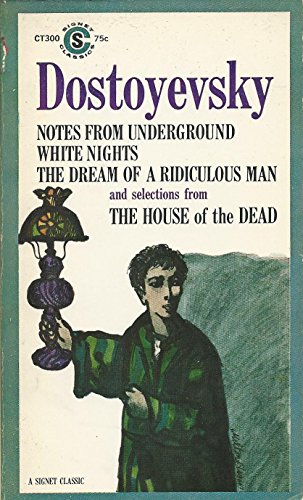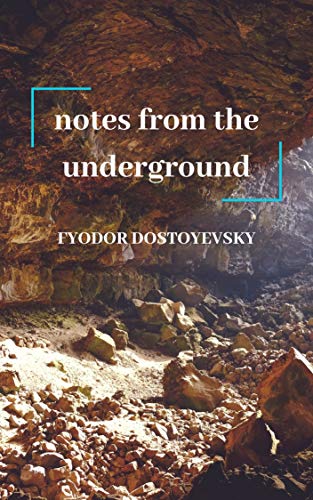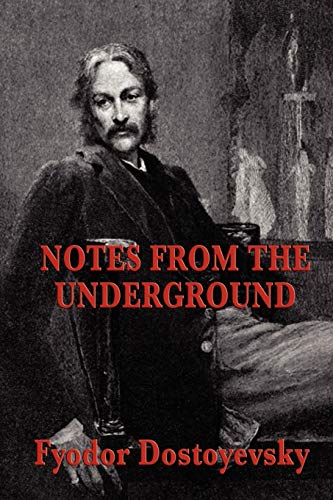-
Notes from Underground
Fyodor Dostoevsky
Paperback (BN Publishing, March 23, 2009)The passionate confessions of a suffering soul; the brutal self-loathing of a tormented man; the scathing scorn of an alienated antihero who has become one of the greatest figures in all literature. Notes from Underground, published in 1864, introduces the moral, political, and social ideas Dostoevsky later explores in such masterpieces as Crime and Punishment, The Idiot, and The Brothers Karamazov .
-
Notes from the Underground
Fyodor Dostoyevsky
Paperback (CreateSpace Independent Publishing Platform, July 18, 2017)Notes from the Underground by Fyodor Dostoyevsky. Worldwide literature classic, among top 100 literary novels of all time. A must read for everybody.In the 1980s, Italo Calvino (the most-translated contemporary Italian writer at the time of his death) said in his essay "Why Read the Classics?" that "a classic is a book that has never finished saying what it has to say", without any doubt this book can be considered a Classic This book is also a Bestseller because as Steinberg defined: "a bestseller as a book for which demand, within a short time of that book's initial publication, vastly exceeds what is then considered to be big sales".
-
Notes from Underground
Fyodor Dostoyevsky
Hardcover (Amereon Ltd, June 1, 1976)This title comes from the award-winning translators of "Crime and Punishment", Richard Pevear and Larissa Volokhonsky. The apology and confession of a minor mid-19th-century Russian official, "Notes from Underground" is a half-desperate, half-mocking political critique and a powerful, at times absurdly comical, account of man's breakaway from society and descent 'underground'.
-
Notes from Underground
Fyodor Dostoyevsky
Mass Market Paperback (Signet Classics, Oct. 1, 1961)In this Signet Classic volume can be seen Dostoyevsky's evolving outlook on man's fate. The works presented here were written at distinct periods in the author's life, at decisive moments in his groping for a political philosophy and a religious answer.
-
Notes From the Underground
Fyodor Dostoyevsky
Hardcover (Pinnacle Press, May 25, 2017)This work has been selected by scholars as being culturally important and is part of the knowledge base of civilization as we know it.This work is in the public domain in the United States of America, and possibly other nations. Within the United States, you may freely copy and distribute this work, as no entity (individual or corporate) has a copyright on the body of the work.Scholars believe, and we concur, that this work is important enough to be preserved, reproduced, and made generally available to the public. To ensure a quality reading experience, this work has been proofread and republished using a format that seamlessly blends the original graphical elements with text in an easy-to-read typeface.We appreciate your support of the preservation process, and thank you for being an important part of keeping this knowledge alive and relevant.
-
Notes from the Underground
Fyodor Dostoyevsky, Constance Garnett
Paperback (CreateSpace Independent Publishing Platform, June 17, 2015)Notes from Underground, also translated as Notes from the Underground or Letters from the Underworld, is an 1864 novella by Fyodor Dostoyevsky. Notes is considered by many to be the first existentialist novel. It presents itself as an excerpt from the rambling memoirs of a bitter, isolated, unnamed narrator (generally referred to by critics as the Underground Man) who is a retired civil servant living in St. Petersburg. The first part of the story is told in monologue form, or the underground man's diary, and attacks emerging Western philosophy, especially Nikolay Chernyshevsky's What Is to Be Done?. The second part of the book is called "Apropos of the Wet Snow", and describes certain events that, it seems, are destroying and sometimes renewing the underground man, who acts as a first person, unreliable narrator.
-
Notes from Underground
Fyodor Dostoyevsky
eBook (Otbebookpublishing, Dec. 27, 2015)"Notes from the Underground" is considered by many to be the first existentialist novel. It presents itself as an excerpt from the rambling memoirs of a bitter, isolated, unnamed narrator (generally referred to by critics as the Underground Man) who is a retired civil servant living in St. Petersburg.
-
Notes From Underground
Fyodor Dostoevsky, Constance Garnett
Paperback (CreateSpace Independent Publishing Platform, Jan. 1, 1864)Notes from Underground, also translated as Notes from the Underground or Letters from the Underworld, is an 1864 novella by Fyodor Dostoevsky. Notes is considered by many to be one of the first existentialist novels. It presents itself as an excerpt from the rambling memoirs of a bitter, isolated, unnamed narrator (generally referred to by critics as the Underground Man) who is a retired civil servant living in St. Petersburg. The first part of the story is told in monologue form, or the underground man's diary, and attacks emerging Western philosophy, especially Nikolay Chernyshevsky's What Is to Be Done?. The second part of the book is called "Apropos of the Wet Snow", and describes certain events that, it seems, are destroying and sometimes renewing the underground man, who acts as a first person, unreliable narrator and anti-hero.
-
Notes from Underground
Fyodor Dostoevsky
eBook (, March 31, 2020)Notes from Underground , also translated as Notes from the Underground or Letters from the Underworld, is an 1864 novella by Fyodor Dostoevsky. Notes is considered by many to be one of the first existentialist novels.It presents itself as an excerpt from the rambling memoirs of a bitter, isolated, unnamed narrator (generally referred to by critics as the Underground Man), who is a retired civil servant living in St. Petersburg. The first part of the story is told in monologue form, or the underground man's diary, and attacks emerging Western philosophy, especially Nikolay Chernyshevsky's What Is to Be Done? The second part of the book is called "Apropos of the Wet Snow" and describes certain events that appear to be destroying and sometimes renewing the underground man, who acts as a first person, unreliable narrator and anti-hero.
-
Notes from the Underground
Fyodor Dostoyevsky, 1st World Publishing
Hardcover (1st World Publishing, July 25, 2013)Purchase one of 1st World Library's Classic Books and help support our free internet library of downloadable eBooks. Visit us online at www.1stWorldLibrary.ORG - - I am a sick man. ... I am a spiteful man. I am an unattractive man. I believe my liver is diseased. However, I know nothing at all about my disease, and do not know for certain what ails me. I don't consult a doctor for it, and never have, though I have a respect for medicine and doctors. Besides, I am extremely superstitious, sufficiently so to respect medicine, anyway (I am well-educated enough not to be superstitious, but I am superstitious). No, I refuse to consult a doctor from spite. That you probably will not understand. Well, I understand it, though. Of course, I can't explain who it is precisely that I am mortifying in this case by my spite: I am perfectly well aware that I cannot "pay out" the doctors by not consulting them; I know better than anyone that by all this I am only injuring myself and no one else. But still, if I don't consult a doctor it is from spite. My liver is bad, well - let it get worse! I have been going on like that for a long time - twenty years. Now I am forty. I used to be in the government service, but am no longer. I was a spiteful official. I was rude and took pleasure in being so. I did not take bribes, you see, so I was bound to find a recompense in that, at least. (A poor jest, but I will not scratch it out. I wrote it thinking it would sound very witty; but now that I have seen myself that I only wanted to show off in a despicable way, I will not scratch it out on purpose!)
-
Notes from Underground
Fyodor Dostoevsky
eBook (Dover Publications, April 11, 2020)Notes from Underground (pre-reform Russian: Записки изъ подполья; post-reform Russian: Записки из подполья, tr. Zapíski iz podpólʹya), also translated as Notes from the Underground or Letters from the Underworld, is an 1864 novella by Fyodor Dostoevsky. Notes is considered by many to be one of the first existentialist novels.[1] It presents itself as an excerpt from the rambling memoirs of a bitter, isolated, unnamed narrator (generally referred to by critics as the Underground Man), who is a retired civil servant living in St. Petersburg. The first part of the story is told in monologue form, or the underground man's diary, and attacks emerging Western philosophy, especially Nikolay Chernyshevsky's What Is to Be Done?[2] The second part of the book is called "Apropos of the Wet Snow" and describes certain events that appear to be destroying and sometimes renewing the underground man, who acts as a first person, unreliable narrator and anti-hero.[3]
-
Notes from the Underground
Fyodor Dostoyevsky
Paperback (SMK Books, March 26, 2009)Notes from Underground is a study of a single character, and a revelation of Dostoyevsky's own deepest beliefs. In this work we follow the unnamed narrator of the story, who, disillusioned by the oppression and corruption of the society in which he lives withdraws from that society into the underground. On the surface this is a story of one man's rant against a corrupt, oppressive society, but this philosophical book also explores the deeper themes of alienation, torment and hatred.